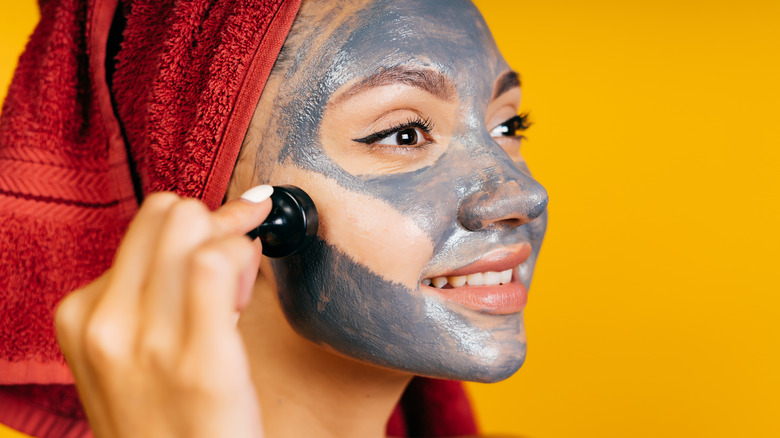Are Magnetic Face Masks Safe For Your Skin?
Face masks are loved by skincare fans for a reason. After all, there's a type for almost every skin concern imaginable. According to Allure, some masks are all about hydration, such as cream masks; some are dripping with actives, like sheet varieties; and others tackle acne flare-ups, like charcoal masks.
A few years ago, another type of face mask started popping up on social media and beauty store shelves: the magnetic mask. A 2016 Instagram video showed singer Madonna removing a dark-colored clay mask from her face using only a chrome wand — no sink required. The products, it turns out, were from her skincare line, MDNA, and the mask was the Chrome Clay Mask. This product contains a magnetic coating that can be removed with a magnetic device.
Madonna may have popularized the trend, but she's no longer the only one to recommend these futuristic masks. Dermatologist Dr. Whitney Bowe told Observer that "[Magnets] have been known to help healing wounds and calming inflammation, and are a very hot area of research right now." Currently, studies proving the benefits of magnetic face masks are limited. Still, these skincare products are believed to detoxify, prevent or treat signs of aging, and nourish and soften the skin.
The potential upsides are tempting, but are these masks safe enough to add to your skincare routine?
Magnetic face masks are safe for most skin types
Magnets may be a major departure from mud, aloe vera, hyaluronic acid, and other ingredients commonly found in face masks (per Healthline). Even so, they're generally harmless for the skin, dermatologist Dr. Mona Gohara told Cosmopolitan. However, people with sensitive skin or reactive skin conditions such as rosacea may want to skip magnetic face masks, as iron powder (which is added to the masks to make them magnetic) can be irritating.
Acupuncturist Dr. Elizabeth Trattner told Romper that magnetic face masks are also okay for women to use during pregnancy, a time when skin flare-ups can be at an all-time high due to fluctuating hormones. Still, it's important to watch for potentially harmful ingredients, such as retinoids and high doses of salicylic acid, when choosing masks and other skincare products (per Healthline).
Dr. Joshua Zeichner, Director of Cosmetic and Clinical Research in Dermatology at Mt. Sinai Hospital, told the Daily Mail that the biggest risk of magnetic face masks might be their hefty price tag. "The only harm they pose is likely to your pocketbook. ... If in your budget, they certainly are worth trying, but they will likely not take the place of traditional salicylic acid or clay masks," he says.


